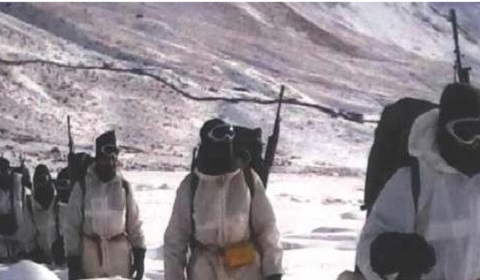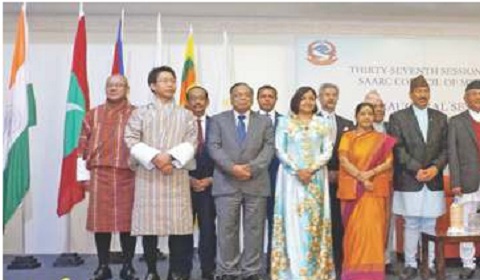The National Defence College of India is located at 6, Tees January Marg, New Delhi. It was conceived as an institution where prospective and present policymakers in government, particularly the department of defence, would gain a broad perspective of Indian and International affairs. The roles of the College are as follows:-
To bring together selected senior officers from various organs of the Government and friendly foreign countries for the purpose of giving them a structured exposure to various issues related to the national security of a modern state in general and India in particular. The College seeks to prepare these officers for higher responsibilities in the management of national security and other related areas of public policy through research and thinking on inter-related issues in an academic environment.
To develop a thorough and lasting mutual understanding amongst the participants by creating the necessary working environment and opportunities for the development of such an understanding between officers under training at the College. Serve as an instrument for the Government of India to foster better understanding, mutual co-operation and desirable linkages in the national, regional and international security-related fields with friendly foreign countries.
The Course is run for 47 weeks from January to November every year, divided into six studies. These six studies, in sequence, are Understanding India & Introduction to Strategy, Study on Economic Security, Science and Technology, Global Issues, International Security Environment, India's Strategic Neighbourhood and finally Strategies and Structures for National Security.
The objectives of the course are :-
To provide the participants a detailed exposure to views and opinions of experts from different fields on numerous issues related to National Security. To give the participants a first-hand feel of the ground-level situation in various fields related to National Security, which includes socio-political environment, science and technology, the economic scenario and defence capabilities and limitations.
To promote forward-thinking about the shifting pattern of international, political, economic and military relationships, and implications of such relationships on National Security. For this purpose, participants get an opportunity to interact with Ambassadors, key opinion makers both at home and abroad, and representatives of international organisations.
To provide an opportunity and an appropriate environment to the participants to develop a lasting mutual understanding and spirit of co-operation among themselves and their respective organisations/countries.
To facilitate the participants to interact with colleagues from different walks of life, to address macro-level issues in a holistic/empirical manner, and to prepare them to take on responsibilities at the highest level in their respective organisations.
At present, 120 members attend the course including officers who are invited from overseas. They are drawn from the Indian Armed Forces, Indian Civil Services, Indian Police Services and other organs of the Government. While the Service Officers are normally of the rank of Brigadier or equivalent, the Civil and Diplomatic service officers are at the level of Director/Joint Secretary to the Government of India. The course members are highly qualified and diverse in terms of culture, background, nationality, work and life experiences, skills and interests - an essential underpinning of the programme that lays stress on the value of diversity. The current course has 40 officers from friendly foreign countries namely Afghanistan, Australia, Bangladesh, Bhutan, Brazil, Egypt, Indonesia, Iran, Japan, Kenya, Kazakhstan, Maldives, Myanmar, Nepal, Nigeria, Philippines, Russia, Saudi Arabia, South Africa, Sri Lanka, UK, USA, Uzbekistan and Vietnam.
The Speaker is introduced to the Faculty and Course Members for about 05 minutes. This is followed by the talk/presentation which could be planned for a maximum of one hour. Training aids available with the College include a video wall to enable PowerPoint presentations.
The talk is followed by a Coffee break and thereafter the Course members are given about an hour for a Q & A and interactive session with the speakers. The session concludes with a summing up by the Commandant.
Strict confidentiality is maintained and the Speaker is not quoted outside the College. The Speaker joins the Commandant, the faculty and the course members for Luncheon at the Commandant's Table.
A total of six modules form part of the course curriculum, each of it drafted and conducted by the nominated SDS (Senior Directing Staff). Keeping into consideration the current issues/scenarios which directly/indirectly affect the National Security Scenario, seven group titles and a further 03 sub-group titles (total of 21 titles under each study) are given for course members to discuss, analyse and evolve a paper (3000-4000 words). For the same, course members are aided by the SDS i/c calling at least one subject matter expert for each subgroup title. The six study modules conducted as part of NDC are as follows:-






Two SGE are conducted as part of the curriculum. SGE-I scheduled in the first half relates to the internal issues covering aspects as LWE, J&K and NE issues and SGE-II deals with international issues which have direct bearing on National Security, which is scheduled during the last study.
Two day Media capsule is planned during the fourth study to provide an exposure to the course participants in regard to media handling when addressing National Security issues as various appointments.
NDC Seminar is conducted in the second week of July. Based on the Topic selected, Course members articulate/arbitrate titles under topic and also provide a paper which is subsequently published in the NDC Journal.
Two day capsule on developing acumen for taking strategic decisions is conducted. An array of experts from practitioners to scholars are invited for the capsule.
As and when an opportunity is offered by the occurrence of major events (eg. COVID-19 Pandemic) that are likely to significantly impact world's / nation's future; the course members are assigned a task to carry out critical analysis of likely impact and suggested strategies as a response. After few months, the members carry out a self appraisal of their own previous strategic analysis of the occurrence, or events, and its subsequent outcome.
As part of the course curriculum, the course members are taken on various tours to provide better exposure and relate the on-ground scenario with the issues covered in the study module. Following are the study tours:-
(a) Understanding India and Economic Security Study Tour (UI & ESST)
(b) Foreign Countries Study Tour (FCST)
(c) Foreign Officers Study Tour (FOST)
(d) Strategic Neighbourhood Study Tour
(e) Army and Air Force Tour
(f) Naval Tour
(g) Local Visits